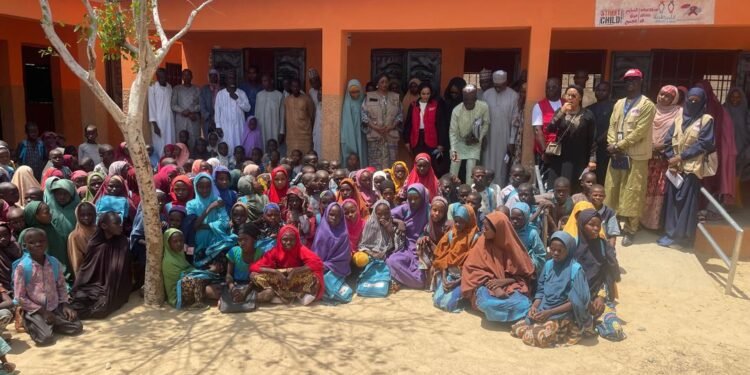By Sam Kayode
In a significant humanitarian effort, the Qatari-based international charitable nongovernmental organisation, Education Above All (EAA), has made a profound impact on the lives of out-of-school children in Borno, Yobe, and Adamawa (BAY) states.
These (BAY) States have been severely affected by the Boko Haram insurgency, which has displaced over two million people and claimed over 300,000 lives.
EAA, in collaboration with ‘Street Child’ Nigeria, has successfully enrolled over 12,000 out-of-school children in these BAY states, with a target to reach over 40,000 of them in the next two years, prior to the end of the project and beyond in case it is renewed based on humanitarian gesture.
The insurgency’s epicentre, Borno State, has been particularly hard hit, with countless children left without access to education due to the ongoing conflict and subsequent displacement from their ancestral homes which is why the EAA’s efforts to rebuild the education system in these areas have brought hope and stability to many vulnerable families.
While emphasising the commitment of the organisation to these vulnerable kids, EAA’s education Specialist, David Momo emphasised that “Over 6,000 vulnerable children from among the internally displaced persons (IDPS) living within host communities have been sponsored back to school under our partnership with Street Child Nigeria.
“This initiative not only addresses the immediate educational needs of these children but also provides a foundation for their future.” He revealed.
EAA has gone beyond mere enrollment which is their primary goal, it has built and renovated classrooms and schools, particularly focusing on public and community-based institutions.
” In areas such as Muna Moforo and Bayan Bakasi, new classrooms have been constructed, and existing ones have been refurbished to create a conducive learning environment for the children.
“These efforts ensure that the children have access to quality education in a safe and supportive setting.” He stressed.
Recognising the critical role of teachers, EAA has also recruited and paid for educators, with a special emphasis on those working with vulnerable children.
By providing regular salaries and professional development opportunities, EAA ensures that these teachers are well-equipped to handle the unique challenges faced by their students.
In addition to educational support, EAA has implemented programs aimed at empowering parents, particularly women, with the capital needed to start and grow businesses.
This financial assistance is closely monitored to ensure sustainability, enabling parents to support their children’s education long-term. This holistic approach addresses the root causes of poverty and displacement, fostering resilience within the community.
EAA’s initiatives are part of a broader strategy to support less privileged children in over 70 countries across Africa, Latin America, Asia, and the Caribbean.
Their global reach and experience in addressing educational disparities make them a critical partner in rebuilding communities affected by conflict and disaster.
In Yobe and Adamawa states, EAA’s efforts have also been met with enthusiasm.
Local communities have welcomed the support, which has significantly improved access to education for many children who would otherwise remain out of school.
The organisation’s interventions have been instrumental in stabilising these regions, providing children with a sense of normalcy and hope for the future.
The collaboration between EAA and Street Child Nigeria exemplifies the power of partnership in addressing complex humanitarian crises.
By combining resources and expertise, the two organisations have been able to achieve remarkable results in a relatively short period.
Community leaders in Borno, Yobe, and Adamawa have expressed their gratitude for EAA’s support.
Many have noted that the presence of EAA and its partners has not only improved educational opportunities but also strengthened social cohesion within the communities. Parents and children alike have shared stories of transformation and renewed hope thanks to EAA’s interventions.
EAA’s comprehensive approach includes psychosocial support for children who have experienced trauma due to the conflict.
Trained counsellors and social workers are available to help these children cope with their experiences, ensuring they can fully participate in their education.
The organisation’s commitment to transparency and accountability has also been a key factor in its success.
Regular monitoring and evaluation of programs ensure that resources are used effectively and that the needs of the children are being met.
As EAA continues to expand its efforts in Nigeria, it remains focused on sustainability.
By building local capacity and involving community members in program implementation, EAA ensures that the benefits of its interventions will be long-lasting.
Looking ahead, EAA plans to scale up its operations to reach even more children in need. With the continued support of donors and partners, the organisation aims to further its mission of providing quality education to every child, regardless of their circumstances.
The story of EAA’s work in northeastern Nigeria is a testament to the resilience of the human spirit and the transformative power of education.
Despite the challenges posed by the Boko Haram insurgency, the organisation’s unwavering dedication to the children of Borno, Yobe, and Adamawa has brought about significant change and laid the groundwork for a brighter future.
EAA’s initiatives underscore the importance of international solidarity in addressing global crises. By standing with the children of northeastern Nigeria, EAA and its partners are making a profound difference in the lives of thousands and setting an example for others to follow.


